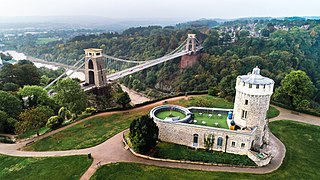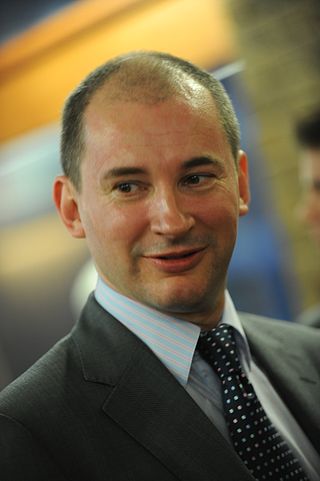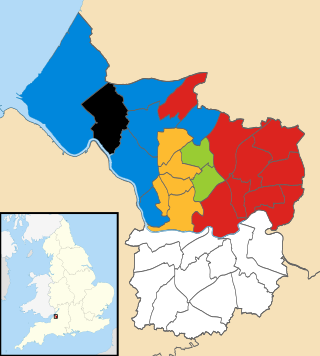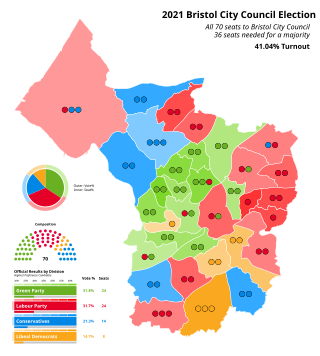
Bristol is a city, unitary authority area and ceremonial county in South West England, the most populous city in the region. Built around the River Avon, it is bordered by the ceremonial counties of Gloucestershire to the north and Somerset to the south. The county is in the West of England combined authority area, which includes the Greater Bristol area and nearby places such as Bath.

Bristol East is a constituency recreated in 1983 covering the eastern part of the City of Bristol, represented in the House of Commons of the UK Parliament since 2005 by Kerry McCarthy of the Labour Party.

Stephen Roy Williams is a British Liberal Democrat politician who served as Member of Parliament (MP) for Bristol West from the 2005 general election until his defeat by Labour Party candidate Thangam Debbonaire in 2015. As an MP, he served in the Cameron–Clegg coalition government as Parliamentary Under-Secretary of State in the Department of Communities and Local Government from 2013 to 2015.
Bristol City Council is the local authority for Bristol, a unitary authority and ceremonial county in England. Until 1 April 1996 it was a non-metropolitan district in Avon. Since 2012 it has also had a directly elected mayor.

Bristol City Council is the local authority of Bristol, England. The council is a unitary authority. Bristol has 34 wards, electing a total of 70 councillors.

Barbara Lilian Janke, Baroness Janke is a British former teacher and politician. She was the Liberal Democrat leader of Bristol City Council from 2005 to 2007 and from 2009 to 2012. She was first elected councillor for Clifton ward in 1995. She became leader of the Liberal Democrat group in 1997, with a break from 2007 to 2008. In August 2014 Cllr Janke was named as one of six new Liberal Democrat working peers.

The city of Bristol, England, is a unitary authority, represented by four MPs representing seats wholly within the city boundaries. The overall trend of both local and national representation became left of centre during the latter 20th century. The city has a tradition of local activism, with environmental issues and sustainable transport being prominent issues in the city.

The 1995 Bristol City Council election took place on 4 May 1995 with all seats being up for election, in preparation for Bristol City Council becoming a Unitary Authority following the abolition of Avon County Council. The same ward boundaries were used, however these are elections to a new authority and cannot be considered gains or losses compared to previously held seats.

The 2009 United Kingdom local elections were elections held to all 27 County Councils, three existing Unitary Authorities and five new Unitary Authorities, all in England, on 4 June 2009. The elections were due to be held on 7 May 2009, but were delayed in order to coincide with elections to the European Parliament.
The 2002 Stroud District Council election took place on 2 May 2002 to elect members of Stroud District Council in Gloucestershire, England. The whole council was up for election with boundary changes since the last election in 2000 reducing the number of seats by 4. The Conservative Party gained overall control of the council from no overall control.

The 2011 Bristol City Council elections were held on Thursday 5 May 2011, for 24 seats, that being one third of the total number of councillors. The Liberal Democrats, who had won overall control of the council in 2009 and increased their majority in 2010, experienced a drop in support and lost 5 seats; 4 to the Labour Party and 1 to the Green Party, which gained its second ever council seat in Bristol. This meant that the Lib Dems no longer had a majority on the council. However, they continued to run the council, relying on opposition groups to vote through any proposal.
The Mayor of Bristol was the political leader of Bristol City Council. The mayor was a directly elected politician who, along with the 70 members of Bristol City Council, was responsible for the strategic government of the city of Bristol, England. The role was created after a local referendum held on 3 May 2012, which followed the passage of the Localism Act 2011. 41,032 voted for an elected mayor and 35,880 voted against, with a turnout of 24%. An election for the new post was held on 15 November 2012.

Elections for one third of Bristol City Council were held on 2 May 2013 as part of the 2013 United Kingdom local elections. No party gained overall control of the chamber, although administrative power rested with the Mayor of Bristol, who had been first elected in November 2012

The 2014 Bristol City Council election took place on 22 May 2014 to elect members of Bristol City Council in England, as part of the United Kingdom 2014 Local Elections.
The 2015 Bristol City Council election took place on 7 May 2015 to elect members of Bristol City Council in England. This was on the same day as other local elections.

The 2016 Bristol City Council election took place on Thursday 5 May 2016, alongside nationwide local elections. Following a boundary review, the number of wards in the city was reduced to 34, with each electing one, two or three Councillors. The overall number of Councillors remained 70, with all seats up for election at the same time. Elections would then be held every 4 years.

The 2006 Bristol City Council election took place on 4 May 2006, on the same day as other local elections. The Labour Party continued to lose seats, but the Liberal Democrats failed to gain enough to form an overall majority. This election saw the first election of a Green Councillor to Bristol City Council – the first time four parties had been represented since the Council’s creation.

The 2007 Bristol City Council election took place on 3 May 2007, on the same day as other local elections. The Liberal Democrats lost two seats to Labour, but remained the largest party on the Council. No party gained overall control.

The 2021 Bristol City Council election took place on 6 May 2021 to elect members of Bristol City Council in England. It coincided with nationwide local elections. Voters in the city also voted for the mayor of Bristol, the mayor of the West of England and for Avon and Somerset's police and crime commissioner. The election was originally due to take place in May 2020, but was postponed due to the COVID-19 pandemic.

The 2022 United Kingdom local elections took place on Thursday 5 May 2022. These included elections for all London borough councils, for all local authorities in Wales and Scotland. Most seats in England were last up for election in 2018 and in Scotland and Wales in 2017. The elections coincided with the 2022 Northern Ireland Assembly election. In 91 cases, most of them in Wales, council seats were uncontested, each having only one candidate. Three seats in Scotland remained unfilled as no one nominated to fill them.
















